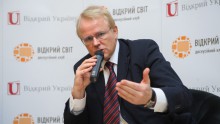“Reviewing Reforms in Ukraine: When Will People Feel the Positive Result?” This rather provocative phrase is the title of the speech made at the Open World debate club by Johannes Regenbrecht, head of the Ukraine Task Force at the Federal Foreign Office of Germany, who has worked in our country since 2014.
In his words, in response to the Maidan’s demands, the Ukrainian government launched an ambitious program of reforms, corruption control, structural reforms in the energy sector, and privatization.
The German diplomat pointed out that a number of anticorruption laws have been passed, an anticorruption bureau had been set up, an anticorruption prosecutor and a new Prosecutor General had been appointed in the past two years.
He went on to say that speedy changes had been made in the energy sector. In particular, the government has made serious efforts to regulate the energy market by raising utility rates, on the one hand, and by introducing subsidies for those unable to pay them, on the other.
At the same time, Mr. Regenbrecht noted that reforms are going in the right direction but slowly, so it is too early to say when the populace will feel the results.
In his words, no results of fighting corruption are visible, the proof of which is the fact that not a single high-profile trial has been held in this country. The Anticorruption Bureau and the special anticorruption prosecutor must become really viable institutions, the diplomat emphasized.
E-declaration has begun to work at last, he continued, but it remains to be seen how it will proceed and whether it will ensure transparency. Thousands of officials, judges, public prosecutors, and tax officers still have to submit their declarations before the end of November, while the Anticorruption Bureau is to check suspicious declarations.
Mr. Regenbrecht claimed that Ukraine is reducing its energy dependence on Russia and, at the same time, is extending its economic ties with the EU. In his view, Ukraine should intensify cooperation with the EU because the projected 1.5-percent GDP growth in this year is not enough to make up war losses.
To do so, Ukraine needs investments in job creation and, accordingly, it should attract investors, and, to this end, we should improve the investment climate, introduce the rule of law, increase independence of the judicial system, eradicate tax system abuses, and ensure the right of ownership for at least 10-15 years.
The diplomat explained that German and EU assistance to Ukraine is tied up to reforms, which is a lever. In his words, the 600-million-euro macroeconomic aid package is being delayed because Ukraine has not met a number of EU-imposed conditions. Particularly, it is necessary to pass a package of energy-related laws about the status of the National Commission for Regulation in the Field of Energy and the Utilities, the reform of the electricity and gas market, as well as the establishment of an energy effectiveness fund.
“Germany will always be rendering financial aid to Ukraine on condition of good governance,” Regenbrecht emphasized. He cited the example of Germany offering financial aid to the administrations of Chernivtsi and Poltava oblasts to help them address their problems by themselves. In 2015 Germany rendered 200-million-euro-worth aid to Ukraine, and Vinnytsia will see in the near future the launching, in the presence of Prime Minister Volodymyr Hroisman, of the 100-million-euro-worth Ulead project aimed at helping Ukraine shape a successful economic policy and leadership.
The diplomat announced that a German Chamber of Commerce office would be opened and a second German-Ukrainian business forum would be held in Kyiv in October. “The EU is interested in stabilization in Ukraine, and we support territorial integrity of Ukraine, which is important for stability in Europe. So it is in our interests to render assistance to Ukraine. It is good that no elections will be held in Ukraine shortly and the Hroisman government is more stable than the one a year ago,” he emphasized.
Asked when Ukrainians will really feel improvements, Mr. Regenbrecht confessed that he had chosen such a provocative theme on purpose.
“There is no rapid progress here as far as the living standards and pensions are concerned, so it is necessary to create systemic conditions that will ensure justice for all. We are still a long way from the critical mass of the reforms that can have an impact on the life of people, so we will pressure the government into carrying out reforms and making the necessary corrections on the move,” the diplomat said.
One of the listeners asked about the possibility of a Marshall Plan for Ukraine, as it once was in the case of Germany. The diplomat answered that the international community could find money for Ukraine, but it will not be a good idea to offer such enormous aid when political corruption is rampant. In his words, the main question now is to ensure financial stability and overcome the “Ukraine fatigue.” For this reason, the EU and the IMF must pressure Ukraine into implementing reforms.
Accordingly, he added, there is interdependence between giving money and carrying out reforms. “We must keep Ukraine and stabilization in focus. Therefore, we will further have a ten-person task force at the German Foreign Office to deal with Ukraine,” Mr. Regenbrecht stressed.








